Popular on Food52
Continue After Advertisement
49 Comments
lala
January 10, 2022
you absolutely DO NOT need to salt pasta water. yes, i'm 100% italian, from italian immigrants...if your sauce/gravy (whatever you call it) is made well, you don't need extra salt. i've done side by side comparisons and there is no taste difference, again, if your sauce/gravy is worth its weight in, well, pasta! everyone gets so caught up in this, its quite ridiculous. do what you want but, seriously, don't do it because "its right" when it isn't. do your own comparison! i've done it with several of family members who were shocked to discover the same thing...salt IS NOT needed and only adds extra sodium.
Stefano
January 28, 2022
Everybody should do what they feel comfortable with…
However if you do not salt the pasta water…pasta will never taste right… And you cannot add salt afterwards to the sauce or to the dish to make up for it… The pasta soaks the salt for flavor with boiling…
Another big mistake Americans make is to just place the sauce on top of pasta while it’s being served… The pasta cannot absorb the flavor of the sauce this way… Drain the pasta… Place it back into the pot… And pour the sauce into the pot and mix until absorbed… Then serve… You will have delicious pasta…
Sì sono Italiano…di Ferrara… ci piace mangiare e cucinare…
The other things Italian American do that we don’t do in Italy is to go crazy with garlic…
We ONLY use garlic as a flavoring agent… For example to sauté in olive oil… And then we put it aside… We rarely mince it and put it directly into a dish… The idea is to get the flavor of garlic but not to eat garlic directly…
And NEVER USE GARLIC POWDER..!!!
However if you do not salt the pasta water…pasta will never taste right… And you cannot add salt afterwards to the sauce or to the dish to make up for it… The pasta soaks the salt for flavor with boiling…
Another big mistake Americans make is to just place the sauce on top of pasta while it’s being served… The pasta cannot absorb the flavor of the sauce this way… Drain the pasta… Place it back into the pot… And pour the sauce into the pot and mix until absorbed… Then serve… You will have delicious pasta…
Sì sono Italiano…di Ferrara… ci piace mangiare e cucinare…
The other things Italian American do that we don’t do in Italy is to go crazy with garlic…
We ONLY use garlic as a flavoring agent… For example to sauté in olive oil… And then we put it aside… We rarely mince it and put it directly into a dish… The idea is to get the flavor of garlic but not to eat garlic directly…
And NEVER USE GARLIC POWDER..!!!
phip
January 3, 2022
Late in life, thank you Helen Rennie, I learned that fresh pasta requires saltier water than dry pasta. This because of fresh pasta's shorter cooking time.
CircularCreeper M.
January 17, 2016
Since salt will lower the boiling point of water, adding when the water is at a full boil could cause a quick transformation to steam and create a mess at a minimum, or hot water on to you which could hurt. Add it to cold water.
Lynn Z.
October 12, 2018
Not true - though it would actually be nice if adding salt could help your water boil more quickly, it's the opposite - adding a solute like salt or sugar to a solvent (here, water) results in boiling point elevation, not depression. Adding salt when your water is already boiling could, however, put you in danger of getting burned if you aren't careful and let your hand or metal spoon contact the steam...but I've never had this issue. I like to wait for the reasons outlined in this article (avoiding pitting the pot), and salt will dissolve more easily in hot water, giving you a nice even distribution. Neither way is wrong, just works better for me and I've never had a problem. I don't usually wait until I'm at a full boil, however, as I like it to have time to dissolve fully before I add my pasta, and I have no patience - as soon as we've got a boil, the pasta goes in!
Carmen
April 3, 2014
The comment that Margaret Magennis Quinn left, was NOT in response to MY comment, but to the first picture, which is indeed a pot that definitely could stand some cleaning.
Margaret M.
April 3, 2014
As soon as I saw that dirty old pot, you lost me. Clean your post, inside and OUT. Lazy, lazy lazy.
Carmen
April 3, 2014
I don't add any salt to my pasta, and no one has complained that it doesn't have any salt. I also don't add salt to the sauce for the pasta, this isn't because I have a medical condition, I just feel that the person eating the dish, should have the option to either salt or no salt, my husband salts his, my granddaughter and I don't.
Joe B.
April 1, 2014
This strange article keeps trying to equate the amount of salt to use to the amount of pasta (like, two tablespoons per pound of pasta). The amount of pasta is meaningless, what matters is the amount of WATER you boil. If you tend to use a huge pot full of water, the salt will be FAR more diluted and you will need to add more to get it salty enough to "taste like the sea". The amount of pasta you put IN the water doesn't matter. This is obvious, why doesn't the article address this?
Steven M.
April 2, 2014
I agree completely!!! In fact, I watch a lot of cooking shows and collect recipes on-line as well, but I cut the salt back by 1/2 to 2/3. I want my food seasoned and taste delicious, but I certainly do not want my blood pressure to be 200/120.
Jeff C.
October 22, 2017
You cut back from 1/2 to 2/3? I think you mean you cut back from 1/2 to 1/3.
Lynn Z.
October 12, 2018
You're right and the article should address this - but I think the author (probably incorrectly) assumes that readers more or less will be using the same amount of water per pound, following classic Italian cooking guidelines (about 4 quarts/16 cups per pound is what I generally see as the standard).
Stefano
January 28, 2022
Check with your MD…
I have serious hypertension… But the amount of salt that we add to the boiling water is inconsequential to your blood pressure…
I have serious hypertension… But the amount of salt that we add to the boiling water is inconsequential to your blood pressure…
Steve M.
March 28, 2014
Chef Stevorino signing off. Stay tuned for my book, "Joe Can Cook". Coming later this year. In the making since 2005. Awesome stuff in there! You eata my ah pasta ya gonna get ah fat ah. :)
Steve M.
March 28, 2014
I agree--put the salt in after water boils. Use a good coarse Kosher salt. Not only will it save the pan over time, it will taste fresher.
Steve M.
March 28, 2014
To make Marinara sauce more authentic, add the rhine of a Parmesan Reggiano cheese wedge(The part you throw away), and a half a tube of anchiove paste. Relax...it won't be fishy. Try a little mixture in a bowl first if your paranoid. Using a very fine Chianti or Cabernet reduction will help a lot. Boil deseeded Roma tomatoes in wine and reduce the 2 cups wine until 1/4 the size. Add giant can of S&W Ready cut tomatoes(Costco) that are drained and patted dry by paper towels, twice. Pat dry very hard in collendar or sauce will be watery. Add Basil, Rosemary, Lots of oregano, 1-2 cloves minced garlic, dash if sugar and EV Olive Oil, several dashes of salt, if adding salt, 3 dashes Pepper, dash of chili powder, and a dash of Pinot Grigio Vinegar(Whole foods sells it). Hand blend to semi-chunky. Serve after 7 Min of heating. After 9-10 Min, the herb flavor starts to disappear. Grab it fresh. More flavor! Entire meal takes 15 Min. White pepper optional. Use fresh herbs!!! Sometimes I use Thyme and margerum. Ok I can't spell. :)
Steve M.
March 28, 2014
I use to put zero salt, and make my sauce saltier. Try this. Put zero salt in the sauce, and put a ridiculously large amount in the water. You will end up eating less sodium as most if it is in the water, plus the pasta is more flavorful. Most of the time I put salt in both, but try this trick. I saw a famous Chef do this on Emeril---he disagreed with him, but turns out it was good. Only problem is it costs more...but salt is cheap! Bananas helps counteract the sodium intake. I mean eating them...don't put it in the pot. :)
Marilyn
March 26, 2014
I have to eat a low sodium diet, so I never salt my water these days. but Iwill try it next time I cook pasta. I always see star chefs on TV saying they are putting in a few teaspoons of salt to a dish, but they are clearly putting in more.
PazzoNico
March 21, 2014
Here's what I always tell people (actually, I was training a new guy the other night on the pasta station); salt your water and TASTE it. Dip your finger in, taste..if you don't cringe, it's not salted enough.
I do a "3 count" when pouring in the salt for service every night. Granted, it's about a 30 qt pot. And also, it's kosher salt, so the "salinity" will be less intense with more salt.
I do a "3 count" when pouring in the salt for service every night. Granted, it's about a 30 qt pot. And also, it's kosher salt, so the "salinity" will be less intense with more salt.
Ackker
March 21, 2014
Personally I like to use pugils (soft G as in pugilist), the amount of a substance that you can pick up with your thumb and first two fingers. I like the anachronistic.
ATG117
March 21, 2014
Wish there was a blind taste test on this. Despite being an aggressive salter, I find the pasta never picks up enough. I have a similar problem with roasted vegetables, though I'm sure the reasoning differs.
Catherine L.
March 21, 2014
I was surprised to find out how much salt Italian cooking experts actually use. While I was working in a kitchen, the cooks would put a whole handful of salt in their water (granted, it was a much larger pot). I think it just goes to show the pasta absorbs so little of the salt that if you want it to be seasoned, you've got to be a bit more aggressive that you think.
homie S.
March 23, 2014
I keep the coarse salt in a covered jar near the stove, and I simply hold it perpendicular to the surface of the water and give it one shake. I started out my life in Italy putting a conservative pinch in, but I got over that quickly:)
phip
January 3, 2022
I was always told the same thing; a handful in a huge pot of water. I tend to find pasta in most USA homes and restaurants under salted unless there is an Italian in the kitchen.
Kitchen G.
March 20, 2014
I don't like overly salty pasta so I rarely add salt to the water. I think it is a personal taste issue so there's no exact rule!
Guy
March 20, 2014
Marcella Hazan with all her tomato onion and butter magic,was no scientist. You started the article by mentioning the "proper way" to salt your pasta. I find it misleading to reference anecdotal info as the results of your findings.
Taste tests have proven that salting/seasoning your sauce properly is way more important than salting the pasta.***This only holds true if you add your non-salted cooked pasta to a hot pan sauce to finish off the cooking process.
The salt sticking to the pasta is nonsense. That salt is disintegrated moments after hitting a boiling liquid/sauce.
I very rarely add salt to my boiling water and just add a little more salt to the sauce than usual,to compensate for the addition of pasta at the end.
Taste tests have proven that salting/seasoning your sauce properly is way more important than salting the pasta.***This only holds true if you add your non-salted cooked pasta to a hot pan sauce to finish off the cooking process.
The salt sticking to the pasta is nonsense. That salt is disintegrated moments after hitting a boiling liquid/sauce.
I very rarely add salt to my boiling water and just add a little more salt to the sauce than usual,to compensate for the addition of pasta at the end.
homie S.
March 23, 2014
Actually, the salt does not 'stick' to the pasta, it is absorbed by the pasta (think of the salted water as pedialyte for noodles). For empirical evidence of this fact, one only needs to take a good quality dried pasta and cook two batches, one with salt and one without. The one with salt will be delicious simply drizzled with good olive oil. The one without will be boring. As for salting the sauce instead, consider that the flavor of good (fresh or dry) pasta deserves to shine just as much as the sauce. Salt enhances flavor, and any pasta worth eating should benefit from this enhancement so that instead of being smothered, it can marry the sauce.
Allie S.
March 20, 2014
I've always heard that salt increases the boiling point of water, thus cooking the pasta at a higher (better?) temperature. There are also some that argue that adding salt to the water will make it come to a boil faster.
AntoniaJames
March 20, 2014
You'd have to add 2 ounces (that's a lot of salt!) per quart to raise it by about a half a degree Fahrenheit, which I seriously doubt could affect the outcome. That said, it does raise the boiling point of water, which would make it take longer to boil, not shorten the time. Given the quantities noted above, however, the effect in standard practice should not be perceptible. ;o)
yjZuk
March 20, 2014
AntoniaJames is absoultly correct, salt does raise the temperature of the pasta water. in addition, I was always told that the culinary logic behind adding salt (beside flavoring the pasta), was to prevent the drop of the temperature of the pasta water, when you add pasta to it; the higher boiling point of the pasta water, helps to counter this the temperature drop, hence saves time & energy.
David R.
March 21, 2014
As to all the salt-affects-the-water theories (outside of the salt-seasons-the-pasta claims): in my tests, the water doesn't get hot faster, stay hot longer, etc. with salt. BUT: you must of course start with a tremendous amount of water in your super-large pasta-cooking-pot, get it furiously hot before adding pasta, and keep it roiling during the pasta-cooking!
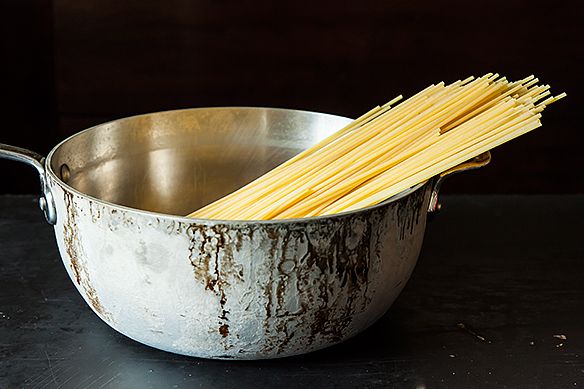
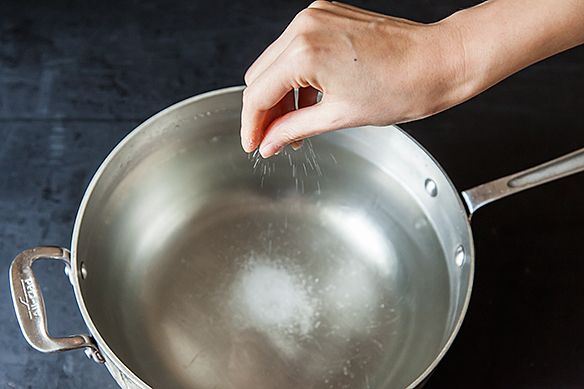
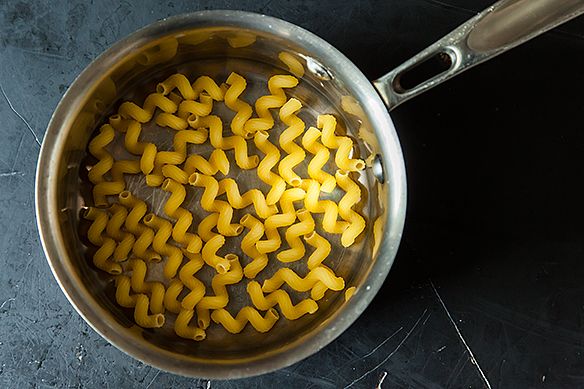
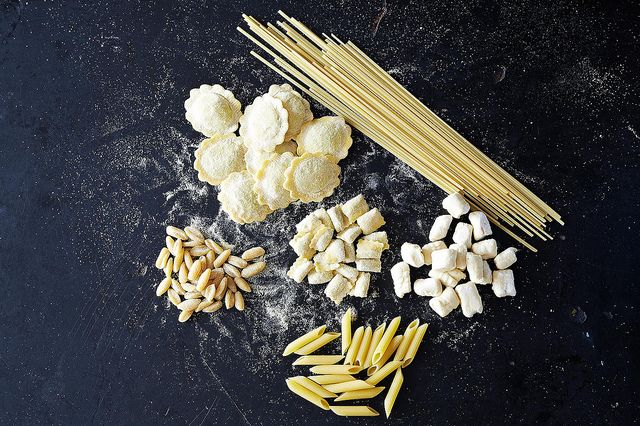
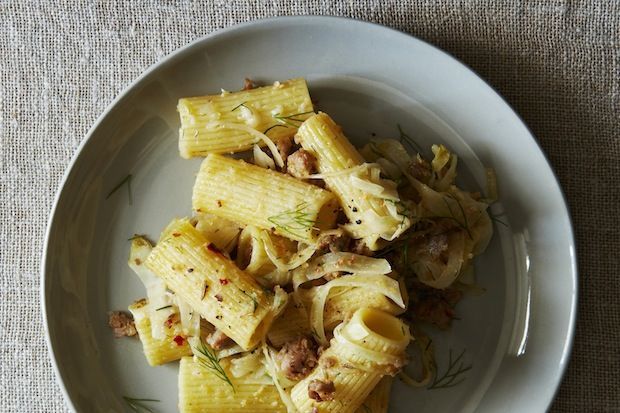

See what other Food52 readers are saying.